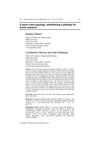 February 2024 in “Recima21”
February 2024 in “Recima21” Covid-19 can cause hair loss due to immune and psychological factors.

OCT can effectively screen and diagnose various medical conditions non-invasively.
 November 2012 in “Hair transplant forum international”
November 2012 in “Hair transplant forum international” Hair loss patients may often have Body Dysmorphic Disorder, and proper psychological assessment and treatment can help.
 23 citations,
December 2009 in “International Journal of Sport Management and Marketing”
23 citations,
December 2009 in “International Journal of Sport Management and Marketing” The document concludes that future research should focus on tailored solutions for managing sports crises and consider legal and cultural factors.
 July 2020 in “bioRxiv (Cold Spring Harbor Laboratory)”
July 2020 in “bioRxiv (Cold Spring Harbor Laboratory)” The structure of SRD5A reveals how it reduces steroids, aiding drug design for related health conditions.
8 citations,
November 2023 in “Social Science & Medicine” Gendered social factors, not just biology, contribute to sex differences in adverse drug events.
 7 citations,
June 2020 in “Translational Andrology and Urology”
7 citations,
June 2020 in “Translational Andrology and Urology” Finasteride for hair loss may cause lasting sexual, genitourinary, mental, and anti-androgenic side effects in young men.
 April 2016 in “Journal of Aesthetic Nursing”
April 2016 in “Journal of Aesthetic Nursing” Men are increasingly removing body hair for looks and cleanliness, and while hair loss can cause distress, it doesn't affect their self-esteem as much as it does in women.
 April 2024 in “Journal of cosmetic dermatology”
April 2024 in “Journal of cosmetic dermatology” Children with alopecia areata have more exclamation mark hairs and fewer yellow dots than adults.








